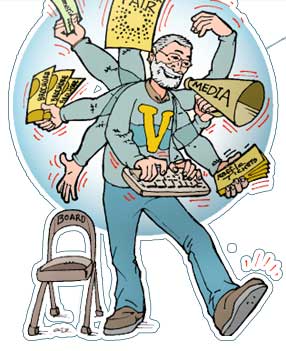








Little Change Over Time in Global Challenges
Brandon
Sun “Small World” Column, Monday, December 4 / 23
Zack Gross
Zack Gross
Back in the summer of 1979, I moved with friends and family to the Brandon area to establish the Marquis Project, an international development organization that, thanks to the support of people in Westman, remains active today, 44+ years later. Through prosperous funding times and poorer ones, the Marquis Project has continued to support community projects in under-served countries while endeavouring to educate people here in Manitoba about global issues.
With our Annual General Meeting looming, I thought I’d look at what made the news and what global challenges we faced when Marquis was just a fledgling organization and I was just a “young pup”, and neither of us were expected to last long. The answer is that a couple of generations later, things really haven’t changed that much and international charitable organizations are still needed to try to make the world a better place.
Today we face war, a climate crisis, the affects of a pandemic, and a growth of authoritarianism, just to name a few issues. Back in 1979, an internet search tells me, in their own way, pretty much the same concerns existed.
Back then, the USSR (now Russia and its allies) invaded Afghanistan. A long list of efforts have been made by invading armies throughout history to “tame” that country, but none have succeeded for long. As well, in 1979, the Ayatollah Khomeini returned from exile to Iran in order to establish a type of Islamist government, and 63 hostages were taken at the US Embassy and held for many months, while foreign workers generally were kicked out of the country.
Idi Amin, a brutal dictator in Uganda, who expelled all South Asian residents, accusing them of controlling the country’s economy, was himself expelled. Canada and other countries, by the way, benefited from an influx of these refugees from Uganda, including doctors, business people and others who make up our multicultural mosaic today.
The Three Mile Island nuclear disaster happened in 1979, with a fire in a reactor in Pennsylvania. This foreshadowed future “accidents” that have been feared but not prevented in Russia, Japan and elsewhere. In Canada, a dangerous chemical train derailment happened in Mississauga, near Toronto.
The SALT II Treaty, Strategic Arms Limitation Treaty, was negotiated by Jimmy Carter and Leonid Brezhnev, but was not fully ratified because of the USSR’s invasion of Afghanistan. This was meant to limit and ultimately reduce nuclear weaponry but didn’t last beyond 1985.
Saddam Hussein became President of Iraq in 1979 and his time in power has been well documented as one of dictatorship, torture and war. Meanwhile, the Sandinistas in Nicaragua took power after a civil war with the goal of a more equitable society, supported by many progressive governments around the world. The Marquis Project led tours there in the 1980s and supported development efforts. These many years later, poverty and political struggle still continue in that Central American country.
Zimbabwe was born as a black-led nation in 1979 after years of brutal white rule as Rhodesia, but unfortunately its first President Robert Mugabe overstayed his welcome and himself became dictatorial, and ultimately was ousted in recent years. Margaret Thatcher was elected Prime Minister of the United Kingdom in 1979, with strong ideas of cutting back government support, fighting unions and leading the nation by her own will and ideology. How many politicians can we name today who seem to have the same plan?
Some respected observers of world issues, such as Hans Rosling in his book Factfulness, argue that the world is actually in a better place today than ever, and that things continue to improve for all people. He argues that our own sense of human drama, our lack of information, and the influence of the media make us fear the worst. However, is it alarming and frustrating that humanity’s history of war, environmental destruction, poverty and anti-democratic abuse continues despite what many enlightened and rational people say and try to accomplish.
A colleague of mine who has studied the non-profit and charitable sector likes to ask the question: Where would we be if we didn’t have organizations that worked to improve society? What would our community and the world look like without development organizations, food banks, homeless shelters, and all the other groups that support those who struggle to improve their lot?
As the holiday season is upon us, and really any time of the year, if you can lend your time, your energy or your dollars to these efforts, maybe we can break the cycle of repeating the bad parts of 1979 over and over again.
Zack Gross is Board Chair of The Marquis Project, a Brandon-based international development organization, and co-author of the new book The Fair Trade Handbook: Building a Better World, Together.
* * * * *
Return to Articles page
Return to Articles page